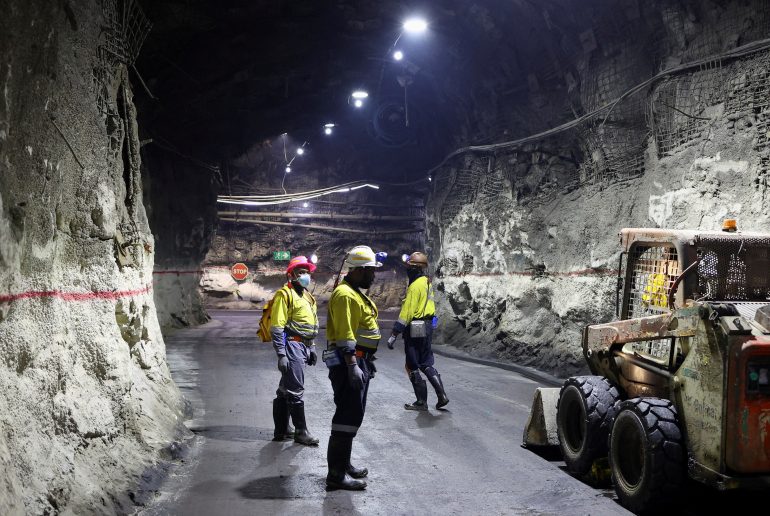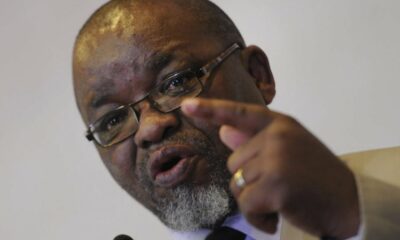Business
Storm Brewing Over South Africa’s Mining Industry as Draft Bill Sparks Outrage

South Africa’s mining industry, long seen as the backbone of the national economy, is standing at a dangerous crossroads. A new draft bill, quietly gazetted on May 20, has set off alarm bells across the sector. While the government believes the proposed changes will usher in stability and drive global competitiveness, industry voices are telling a very different story.
The Draft Mineral Resources Development Bill of 2025, championed by Mineral Resources Minister Gwede Mantashe, is now open for public comment until August 18. But instead of being met with cautious optimism, it’s been greeted with frustration, confusion, and deep concern.
Cracks in the foundation: What’s actually in the Bill?
At face value, the Bill aims to strengthen South Africa’s grip on its mineral wealth, introduce more beneficiation at home, and cement racial transformation in the sector. But beneath the political rhetoric, many see the legislation as a deeply flawed piece of policy.
Critics argue it gives excessive discretionary power to the Minister, allows broad interpretation of empowerment rules, and imposes new regulatory hurdles that threaten to choke an already fragile sector. One particularly controversial provision would require ministerial approval for any ownership changes in mining firms, even if the transaction happens offshore on a foreign stock exchange.
Even more worryingly, mine dumps — previously treated as movable assets — would now require mining licenses, and uneconomic mines in care and maintenance would still be expected to foot the bill for social and labour plans, despite having no income.
The view from the opposition: A death sentence for foreign investment?
James Lorimer, spokesperson for the Democratic Alliance on mineral and petroleum resources, did not mince his words. In his view, the Bill could be the final blow for foreign investors who have already been eyeing the exit.
“This draft is a confusing patchwork of contradictions,” Lorimer warned. “It’s an open door for unchecked political interference and legal battles that will drag on for years.”
He flagged one of the most damaging changes: the potential scrapping of the “once empowered, always empowered” principle. If removed, companies would be forced to repeatedly restructure their ownership to maintain Black Economic Empowerment (BEE) compliance — a costly and unpredictable process.
“The result will be fewer prospecting projects, fewer jobs, and less tax revenue,” said Lorimer. “We’re watching a slow-motion implosion of a sector that should be driving our economic recovery.”
Industry leaders push back: ‘We weren’t even heard’
Mzila Mthenjane, CEO of the Minerals Council South Africa, expressed disappointment that the voices of industry experts had been largely sidelined. Although there were two high-level engagements with the Department of Mineral and Petroleum Resources, Mthenjane says there’s no sign that any of their input made it into the final draft.
Most notably, the Council pushed for prospecting companies to be exempt from the Bill’s strict empowerment rules. “Exploration is a high-risk, capital-intensive game,” said Mthenjane. “Forcing early-stage prospectors to meet the same requirements as major mining operations is unrealistic and deeply damaging.”
He added that South Africa’s mineral exploration landscape is already unattractive to global investors. This new legislation, if passed in its current form, would only widen the cracks.
Political motives or policy missteps?
Critics across the board worry the Bill may be more about entrenching political influence than solving real problems. Some suspect that it’s designed to funnel opportunities to a select group of politically connected individuals, locking in loyalty while undermining broader industry growth.
“Economic empowerment should be about real transformation,” said Lorimer. “But this Bill reads like a playbook for cronyism.”
What’s at stake?
Mining remains one of South Africa’s most crucial economic drivers, contributing to GDP, employment, and export earnings. It also holds the key to the country’s transition to a greener future, with its reserves of critical minerals like platinum, manganese, and vanadium.
With unemployment soaring and the country grappling with energy and infrastructure challenges, mining could be a golden lever for recovery. But this Bill, many argue, threatens to derail any hope of progress.
South Africa already ranks poorly on the Fraser Institute’s global mining investment index, with policy uncertainty cited as a top reason. The new draft could cement the country’s reputation as a hostile environment for business.
Where do we go from here?
The window for public input is open until August 18. This is the time for industry stakeholders, unions, economists, civil society, and citizens to make their voices heard.
The mining sector doesn’t just dig into the earth. It powers livelihoods, builds schools, funds hospitals, and anchors the economy. If this Bill becomes law in its current form, the consequences could ripple for decades.
Now is the time to speak out. South Africa’s future should not be forged in the dark.
If you’re involved in the mining industry, concerned about jobs, or worried about the direction of our economy, submit your comments on the Draft Mineral Resources Development Bill before August 18. Let the Department know that mining policy must be built on inclusion, clarity, and sustainability — not uncertainty and exclusion.
{Source: BusinessTech}
Follow Joburg ETC on Facebook, Twitter , TikTok and Instagram
For more News in Johannesburg, visit joburgetc.com



























